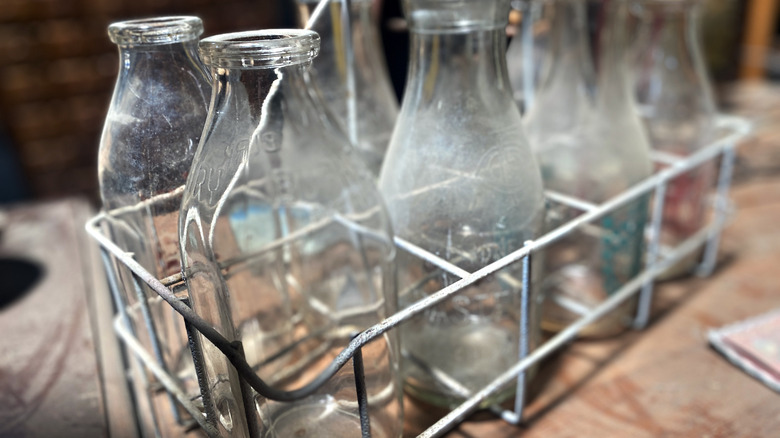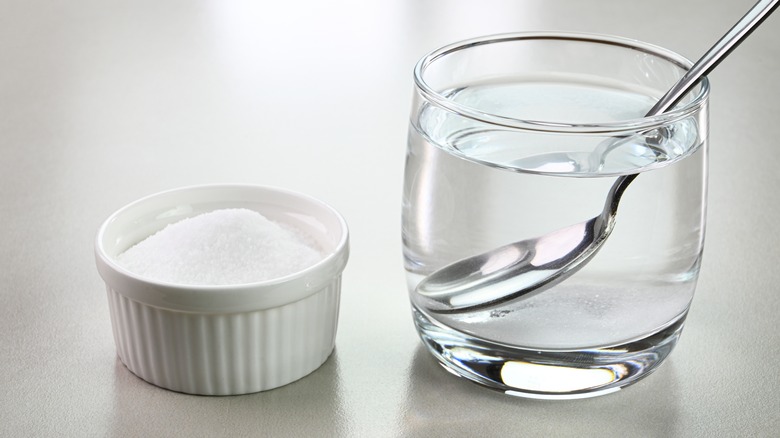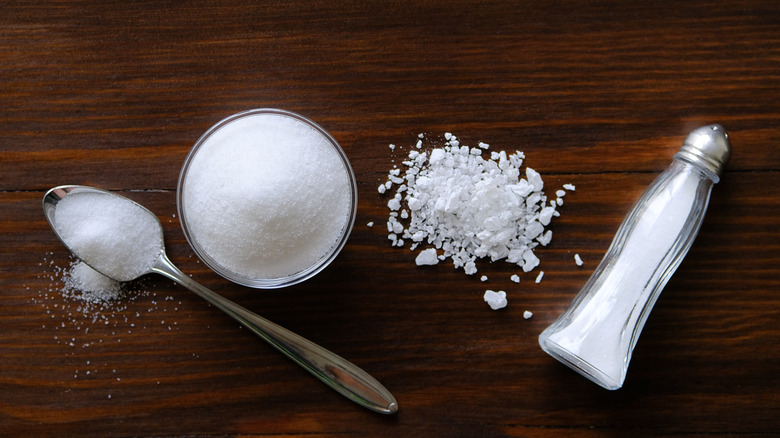Get Bottlenecked Jars Clean With These Household Items (No Sponge Required)
Getting as much mileage as we can out of our glass, metal, and plastic containers helps us do our part to keep waste out of landfills. However, getting everything safely clean can be a conundrum, especially when you're dealing with bottles and other containers with narrow mouths. Even a brush often can't wrestle away the grossness. Luckily, a cheap and easy-to-make combo of household supplies can leave your jars not only sparkling clean but also free of many dangerous bacteria and viruses. Salt mixed with isopropyl alcohol (IPA) is a powerhouse concoction of natural cleaning ingredients that you'll want a healthy stock of in your home.
Researchers from the University of Alberta shared that while 70% alcohol solution can be a powerful foe for viruses and bacteria, the fact that it evaporates so quickly cuts down on its effectiveness. Also, there are bugs that have developed tolerance to IPA. The same researchers discovered that adding salt to the mix helps break down the viruses and bacteria that might otherwise be unscathed by alcohol alone, including ones that have built up a resistance to IPA.
Stir up some solution to use
The miracle pairing of salt and IPA might be part of the secret to a germ-free home. Tests have shown that mixtures containing 70% IPA and over 2.5% salt by weight per volume are more effective at killing microbes than IPA alone. The researchers conducted their experiments using a formula with 5% salt dissolved in 70% isopropanol, and the results were promising enough to hopefully open the doors for its use in the future.
While it's hard to calculate a recipe with the best ratios for this solution, people have shared success stories online of using a mix of ⅓ cup salt mixed with 1 cup IPA. These satisfied posters shared that they soaked their container in the mixture for 30 minutes with visibly pleasing results. This could prove to be a worry-free way to tackle the unseen grossness in opaque metal or plastic bottles. However, don't use this mixture on acrylic bottles, often marked with the number 7 "other" recycling code. Acrylic items are common things you should never clean with rubbing alcohol, since it can damage and discolor the surface.
Why does adding salt to IPA work better?
Perhaps you were already taking advantage of the clever ways to use salt when cleaning your home, and IPA combats microbes pretty darn well by itself. Tests have shown that IPA alone can greatly reduce contamination from nasties like salmonella, several strains of strep and staph, and even HIV. While they weren't entirely eliminated, amounts of these notorious microbes were lowered by more than half after applying IPA.
The salt adds a serious punch to the blend, since it has chemical germ-killing properties, and physical ones that work even harder. Once you apply the liquid to the surface you want to clean, the alcohol begins to evaporate, and the salt solidifies into crystals larger than they were originally. Tests showed that the recrystallization process further killed germs, even alcohol-resistant strains of E-coli. A quick rinse after your microbe-killing session, and your bottle or jar will be sparkling and safe for its next use.


